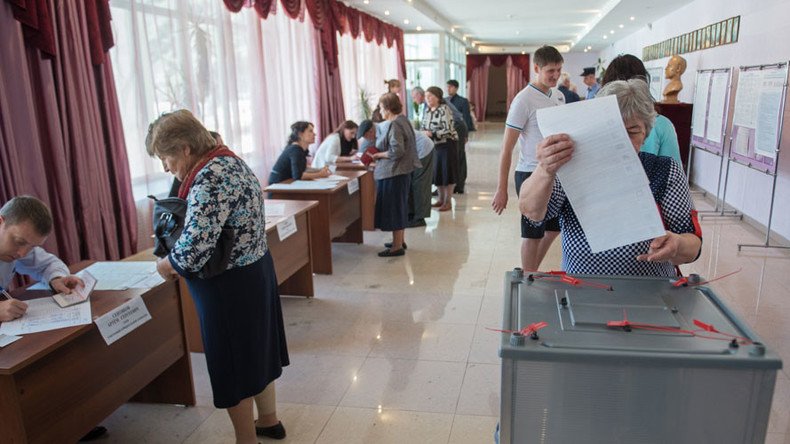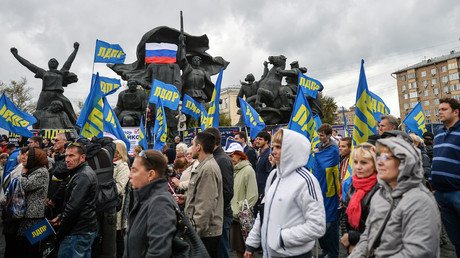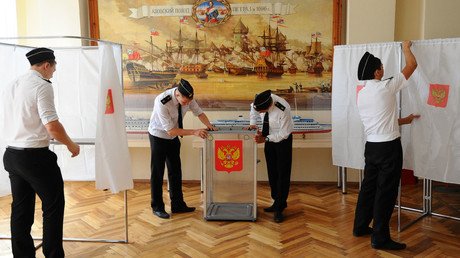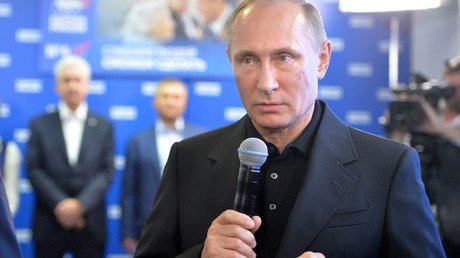Duma elections show Western media what constitutes the real ‘Russian opposition’

Russia's weekend Duma elections were instructive as to the current political landscape in the country. And also notable for some strange western media coverage and poor results for candidates they support.
By now, most of the pundits and pontificators on the Russia beat have had their say on the Duma elections. Of course, as is customary, many appear to be deciphering little from the results and insist on interpreting them through their own prejudices. The great Mikhail Bulgakov once summed up this mentality, “why bother to learn to read when you can smell meat a mile away?”
For those of us willing to open our minds and try to understand, there are a number of big takeaways from last weekend’s vote. The most obvious being the fact that Russia’s pro-Western liberals have never been further from power, at least in the present century, than they are today. And this despite fewer roadblocks being placed in their way compared to previous elections.
The reasons are myriad. In Moscow, the low turnout suggests many voters took the “plague on all your houses” point of view. Yet, the fact liberals couldn’t mobilize more than a couple of thousand votes in single-seat constituencies speaks volumes about their lack of teeth. Which is largely based on how they don’t seem to have a policy platform, apart from being opposed to Vladimir Putin.
Outside of Moscow, they fail to make any impact because they apparently think Russia ends at the MKAD ring-road outside the city. In this they are joined by the Western media, which seems to have no idea of the concerns and motivation of the 130 million or so Russians who don’t live in Moscow. Or what constitutes the popular opposition either, as it happens.
And this last point is very significant because by maintaining the pretense that a bunch of candidates friendly to the West are just waiting for Vladimir Putin to resign in order to create a new Washington-friendly Kremlin they are doing a massive disservice. To everybody. In reality, the situation is completely different and it needs to be explained.
Who's Next?
As the Duma ballot proves, the alternative to Putin is fairly straightforward. When the time comes, a successor will either emerge from his immediate circle - think people like Dmitry Medvedev, Alexei Kudrin or Dmitry Rogozin - or less established figures within front-line Russian politics such as Anton Vaino, Vyacheslav Volodin and Moscow mayor Sergey Sobyanin. However, should the system fail, due to economic circumstances or unforeseen threats, then things are rather bleak from a Western point of view.
Without the pro-Putin United Russia party, it’s currently indisputable that either the Communists or the far right would take over the country. Thus, foreign analysts might want to pause for a deep breath when demonizing the President or wishing for his exit. That’s because after a few months with either of the potential successor movements at the helm, it’s likely they’d be suddenly nostalgic for the man they despise today.
United Russia, for all its faults, is a classical European “catch all” party (like Italy's Forza Italia! or Ireland's Fianna Fail) with no particular ideology, other than the pursuit of power itself. In this, its presence in government is no threat whatsoever to Western interests. However, if the group imploded, and Russians pulled away from the center, the stability of the Putin years would be replaced by one of two extremes.
The first option is radical nationalism, which simmers not too far from the surface in Russia. Currently, the LDPR is led by the buffoonish Vladimir Zhirinovsky, who acts as something of a sponge for extremist vitriol. Nevertheless, in a genuine political crisis, the faction might quickly get its act together, perhaps even allying with Alexei Navalny who, while falsely presented as a liberal in much western media, actually comes from a nationalist background. As a result, the West could be faced with aggressively patriotic opponents who would surely seek to add far more than Crimea to the nation’s territory.
In fact, here’s a sample quote from the current chief: “What will remain of the Baltics (in the event of a war)? Nothing will remain…in Poland, the Baltics, they are doomed. They’ll be wiped out,” he admonished. “Let the leaders of these dwarf states reconsider this. Eastern European states will place themselves under the threat of total annihilation, and only they will be to blame.”
The flip-side would be the Communists. In other words, the heirs of a crew that spent seven decades attempting to use Russian power to spread Marxism around the globe. A movement that frightened the west for over half a century and controlled what Ronald Reagan called the "evil empire."
Myopic media
This is the reality. But the Western press continues to present a false narrative. And here’s a really good example of it, from Time magazine on Thursday last. And note the definite article in the headline: “how Maria Baronova became the face of Russia’s opposition.”
Now, for anybody who really studies Russian politics, the reaction to this balderdash is unprintable here. Interviewed by an American journalist, Baronova speaks of her political transition from fan of Putin and Khodorkovsky to being funded by the latter in this election. The piece also mentions how she supported Putin in the 2000 Presidential poll, when she was around 16 years old.
Sadly, this isn’t the first time that Baronova has been presented as a genuinely significant politician in Western media. Back in 2012, Julia Ioffe made her the subject of a lengthy New Republic profile and she also heavily featured in a 2014 Rolling Stone scare story about Russia. Lucian Kim also devoted much of a Reuters’ blog to the activist in 2012, revealing how “she was unpretentious and smart, with a zany sense of humor.”
Furthermore, if that wasn’t enough, the tabloid Daily Beast gave her a platform and Masha Gessen brought her to the pages of the New York Times. Therein, Baronova was feted as “tall, blond, loud, and given to wearing short skirts and high heels,” as if that was somehow important.
Proof in the Pudding
Now, after all this coverage, you probably assume Baronova walked away with the seat she contested in Moscow’s central district? After all, there aren’t too many Russian Duma candidates - if any - who’ve enjoyed such impressive exposure in some of the world’s most famous news outlets?
Well, actually, she didn’t, and nowhere near it. In fact, she came a distant fourth, with over four times fewer preferences (13,197) than the winner, United Russia’s Nikolai Gonchar (57,110). Indeed, to add insult to injury, she was even defeated by another member of the liberal, pro-western movement, Andrei Zubov (18,789) of the PARNAS party. Incidentally, he was behind the second-placed Communist, Pavel Tarasov (21,442).
So, Maria Baronova is not the face of the Russian opposition. In fact, she’s not even the face of the opposition in the central district of Moscow - because that’s the Communist, Tarasov - nor is she even the leading liberal opposition figure in her area, because that’s Zubov. And it’s not me saying this, it’s the local electorate. Precisely the people who will decide Russia's future.
Yet, Western correspondents in Moscow are giving their readers the impression that Baranova and her fellow travelers represent the alternative to Putin’s leadership of Russia.
No, they don’t. Please, please stop this nonsense. It might encourage a news desk back home to take your copy, but it makes you look stupid.
NOTE: A previous version of this article only referred to numbers for the Tagansky district of Moscow, where Ms Baronova came 5th. This happened due to a misunderstanding in a data request. The amended version includes data for all of central Moscow, where she came 4th.
The statements, views and opinions expressed in this column are solely those of the author and do not necessarily represent those of RT.

















